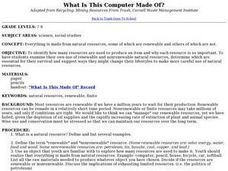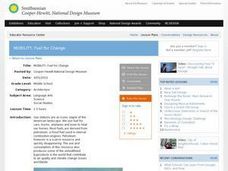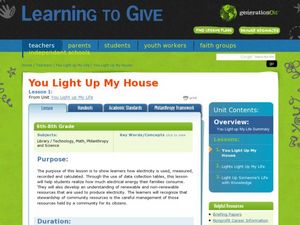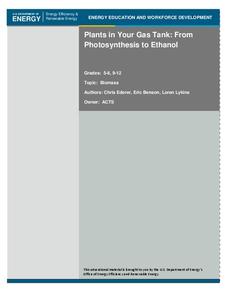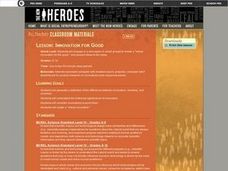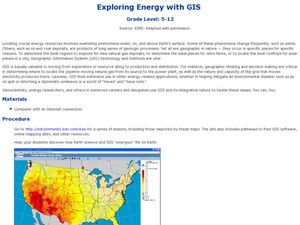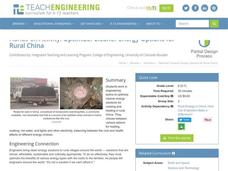Curated OER
What Is This Computer Made Of?
Students identify how many resources are used to produce an item and why each resource is so important. They examine their own use of renewable and nonrenewable natural resources.
Curated OER
Mobility: Fuel for Change
Students determine how to lower the reliance on petroleum-based fuel. In this environmental stewardship lesson, students create concept cars for the future that using renewable energy.
Curated OER
You Light Up My House
Students explore renewable and nonrenewable resources. In this electricity lesson plan, students consider way to reduce the energy that they use as they chart and analyze their own electricity usage.
Curated OER
Fossil Fuels: Facing the Issues
Students explore energy by researching fuel usage on Earth. In this fossil fuel lesson, students define fossil fuels, the energy created by burning them, and the impact on the environment when using them. Students conduct pollution...
Curated OER
Breathing
When learning about the respiratory system, how do learners know what is important? One way is to use a self-assessment or study like the one found here. While the formatting could use some work, the concepts are solid. Depending on your...
Curated OER
Energy in the Round - Solar
Young scholars identify and define terms related to solar energy by playing a class game. In this solar energy lesson, students use provided cards to play a class game. They read the "I have ... Who has" card relating to solar energy and...
Curated OER
The Learning Bottleneck
Students identify and analyze what energy is and how they feel after moving around a lot. They identify other ways that they can acquire heat and if there is some sort of mechanism for storing energy. Finally, students construct their...
Curated OER
A Case of Innovation
Students use strategies to comprehend technical writing. They write reports with great detail, supporting material, and clear vocabulary. They incorporate source materials into their speaking and writing and use voice, tone, and style.
Curated OER
Plants in Your Gas Tank: From Photosynthesis to Ethanol
Explore ethanol and how it is produced. Young scientists investigate photosynthesis and fermentation to the concept of conservation of energy and mass. They discuss the environmental and economical benefits of ethanol as a fuel additive.
Curated OER
Innovation for Good
Many historical innovations were created for the common good. Get your students ready for life as a critical thinker with this lesson which defines the differences between innovation and invention. They will conduct Internet research,...
Curated OER
A Design You’ll Dig: Designing a Habitat for Worms
Students discover how worms contribute to the balance of the environment. In this composting lesson plan, students study the composting and decomposition processes. Students then create habitats for worms that allow them to do their jobs.
Curated OER
More Power to You
Students explore renewable and nonrenewable energy sources and develop a documentary that explores multiple energy sources and draws conclusions about their uses.
Curated OER
Recycling
Middle schoolers relate recycling to waste reduction. In this science lesson, students talk about the environment and how recycling certain natural resources actually saves on energy. They also discuss what type of recycling causes...
Curated OER
Exploring Energy with GIS
Students examine GIS technology as it is used to locate energy sources. In this GIS lesson plan, student access an assigned website to locate a series of lessons using the GIS software. They use the maps that are located on the primary...
Curated OER
Designing "Green" to Save Our Green Planet
Students design an environmentally friendly home. In this middle school math/science lesson, students watch videos on creating green design. Students work in collaborative groups to determine what makes a house green and to design a...
Curated OER
The Flow of Fresh Water
In this water flow instructional activity, students complete 15 word puzzles, a word search, and 2 picture puzzles about the flow of water and erosion.
Teach Engineering
Energy Sources Research
Turn your pupils into teachers! Here is a lesson that requires groups to research an energy source with the provided handout, create a poster, and present their information to the class. Connections are made to practical aspects of the...
Teach Engineering
Trash to Treasure!
One person's trash is another man's treasure. Challenge your class to build something useful out of the trash they throw away on a regular basis. Groups design and build a practical item from trash they collect, allowing the class to...
Teach Engineering
Optimize! Cleaner Energy Options for Rural China
What are the trade-offs when looking to get the most benefit from an energy source? Small groups compare the cost-to-emission levels of several energy sources by looking at the information graphically. The groups utilize this information...
Teach Engineering
Fun With Nanotechnology
Introduce your class to nanotechnology applications with three demonstrations that showcase scientific principles related to ferrofluids, quantum dots, and gold nanoparticles. Groups will work more closely with these applications in the...
Teach Engineering
Energy Conversions
What energy conversions occur in the operation of a device? Small groups investigate devices and the energy conversions that occur. The groups create energy flow diagrams with added conversion processes for each of the devices...
Teach Engineering
Energy Intelligence Agency
Protect the world from energy depletion—join the Energy Intelligence Agency. Using a set of cards, pupils distinguish between correct and incorrect information regarding energy use in the United States. They analyze graphs and diagrams...
Curated OER
Photo Synthesis and Transpiration
Middle schoolers germinate pea seeds and plant the seeds. They experiment with different amounts of light and darkness on the plant growth.
Curated OER
Climate Chaos Week
Pupils research the pros and cons of wind farm technology as an alternative source of energy. The class is divided into two groups that should formulate a debate on each side of the argument. Groups use a debate guide to help develop...


